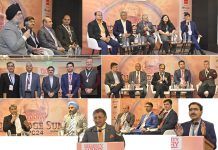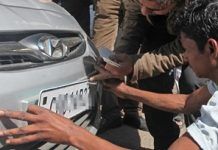Operational personnel connected with Security Services and ATM Cash Services exempted, India needs to do the same.
Apparently the Malaysian Government has declared a Restricted Movement Order from 18 to 31 March 2020. This applies to the whole of Malaysia and governs movement of people. It outlines who will be allowed to move and who wouldn’t.
The National Security Council had a coordination meeting between government agencies on 17 March 2020 to ensure the smooth implementation of the Order. To ensure the needs of the people are not affected during the restricted period, certain services listed in Attachment A (Essential) and Attachment B (Non-Essential) to the order are allowed to operate.
To implement the Restricted Movement Order, the Prevention and Control of Infectious Diseases (Measures Within the Infected Local Areas) Regulations 2020 was gazetted on 18 March 2020. PDRM and RELA have been appointed as the ‘authorized persons’ under Section 3 of the Prevention and Control of Infectious Diseases Act.
The Royal Malaysia Police (often abbreviated RMP) (Malay: Polis Diraja Malaysia (PDRM), is a (primarily) uniformed federal police force in Malaysia and the People’s Volunteer Corps (Malay: Jabatan Sukarelawan Malaysia), abbreviated RELA, is a paramilitary civil volunteer corps formed by the Malaysian government.
To ensure the effectiveness of the Order, the general public is advised to stay home at all times except to fulfill basic needs. Apart from that, the public has been requested to practice social distancing to prevent being infected by COVID-19. However, on 18th March, the first day that this order came into effect, the public did not comply with the restricted movement order and the Malaysian government is contemplating taking the help of its army in enforcing the same.

Mr. Rajeev Sharma, the Country Managing Director of G4S Corporate Services (India) Pvt. Ltd, says that a recent communication from the Municipal Commissioner of Greater Mumbai advises the closure of offices, reduction of employees work force to under 50% for all non essential services and permits only some services linked with providing drinking water, sewerage services, banking services, telephone and internet services, rail and transportation services, food, vegetables and groceries, Hospitals, Medical centers and Medical Stores. Although security services have specifically not been mentioned in this list, he feels that they should have been specifically mentioned and included in the communique and classified as ‘Essential Services”.
For private security providers in India, the thing to note is that for Security/Safety related industries and businesses the Operations/Maintenance/Supply/Service staff has been allowed to be operational, however the General Administration/ Other Staff has had its movement restricted and asked to ‘Work From Home’.

Major Manjit Rajain, the Chairman of the Tenon Group, is of the strong opinion that security services should be categorically classified as ‘essential services’, as private security guards and officers are playing the role of ancillary police force in reduction of crime and the upkeep of the law and order. In the country, there are over 5 million private security guards as compared to the under 3 million state and paramilitary forces put together. “Apart from securing our customers, our facility management workers are also working 24X7 to sanitise the premises of our clients, due to increased demand,” he added.

Meanwhile, Mr. Rituiraj Sinha, the Group Managing Director of SIS Enterprises, expands this by stating that there are over 10 million private security guards, cleaners, pest control technicians, and cash van crew members that fall under “critical services” list to ensure basic services continuity & least disruption in COVID 19 Pandemic Management Measures.
He says that, in a communication sent by him to the Hon’ble Home Minister of India, Sh. Amit Shah today, he has strived to bring certain critical facts to the Minister’s attention, that are very essential in the country’s preparedness to fight the COVID 19 Pandemic.
• Private Security Industry employs more than 50 lacs workers and operates 12,000 cash vans that manage currency supply in the country, as outsourcing agency of banks. Similarly, the Cleaning & Hygiene Services industry has close to 40 lac workers.
• This force of almost 1 crore trained personnel is engaged as the first line of defence for lakhs of offices, public transport, hospitals, RWAs and other establishments in the fight against CoronaVirus.
• Private Security Workers are carrying out fever checks outside thousands of customer establishments and ensuring use of masks, sanitisers etc apart from maintaining access control and material movement in buildings, factories, hospitals, colonies and other such places.
• Cleaning and pest control staff is handling deep cleaning, fumigation, washroom and public place hygiene efforts for lacs of premises across India.
“As an industry, we are facing service disruption, as the State Government orders, like the recent BMC order in Mumbai, are NOT counting these services as ‘Critical Services’ ”, he said. “And, in order to avoid disruption of services, Central government orders and circulars need to categorise Private Security workers, Cash Logistics workers and Cleaning / Facility Management workers as “Critical Services” – just like the government employed healthcare, sanitation and law enforcement workers,” he added.

All three private security industry leaders that SECURITY TODAY interacted with are of the opinion that if their workers, who can lend crucial support to the government in this present COVID-19 crisis, are made to sit at home because of such orders, it will be impossible to motivate them to come back to work at full strength to help in tackling the pandemic situation. Apart from this, if the private security workforce is reduced from the client premises, this may result in a spurt in crime, as the criminals will find it easy to operate. Therefore, it’s crucial to categorise Private Security Services, Cash Management Services and Sanitation Services as ‘Essential Services’.
It is expected that the government has taken note of this and we can hope to see some announcement along these lines, either by the Hon’ble Prime Minister of India, when he addresses the nation tonight, or by way of a government order by tomorrow, just as the Malaysians have done.








